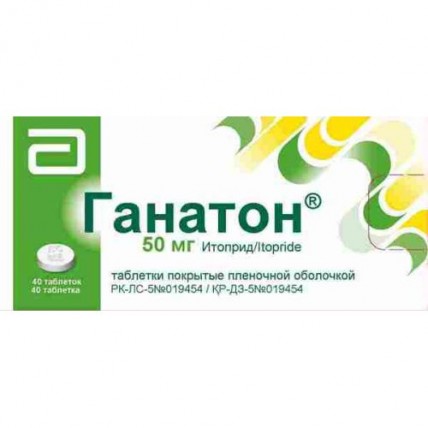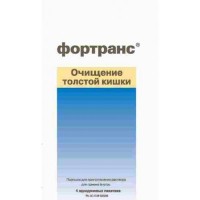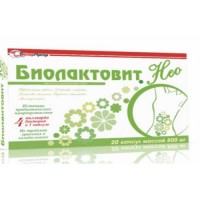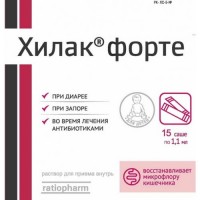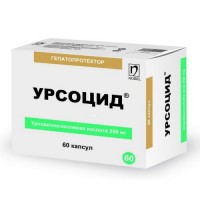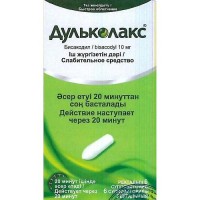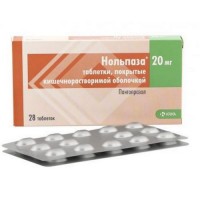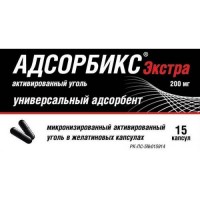Ganaton 40s 50 mg film-coated tablets
- $36.10
The instruction for medical use of GANATON medicine the Trade name Ganaton Mezhdunarodnoye the unlicensed name Itoprid Lekarstvennaya the Tablet form, film coated, 50 mg Structure One tablet contains active agent - an itoprid a hydrochloride of 50 mg, excipients - lactoses monohydrate, starch corn, a karmelloza, acid silicon weak anhydrous, magnesium stearate, structure of a cover of a tablet – a gipromelloz 2910, a macrogoal 6000, the titan dioxide (E 171), wax of karnaubskiya. The description of the Tablet of round shape, film coated white color, with dividing risky on one party and the squeezed-out NANOSECOND 803 code - on other party. Pharmacotherapeutic group Drugs for treatment of functional disturbances from a GIT. Stimulators of motility of a GIT. Itoprid. ATX A03 FA 07 code Pharmacological Pharmacokinetics Absorption properties. Itoprida a hydrochloride is quickly and almost completely soaked up from digestive tract. Its relative bioavailability is 60% that is connected with effect of the first passing through a liver. Food does not affect bioavailability. After use of 50 mg of an itoprid of a hydrochloride of Cmax it is reached in 0.5-0.75 h and makes 0.28 mkg/ml. At the subsequent use of medicine in doses from 50 mg to 200 mg 3 times a day for 7 days the pharmacokinetics of an itoprid of a hydrochloride and its metabolites was linear with the minimum cumulation. Distribution. About 96% of an itoprid of a hydrochloride contact proteins of plasma (mainly with albumine). Binding with α1-кислым a glycoprotein makes less than 15%. Metabolism. Itoprida a hydrochloride biotransformirutsya actively in a liver. 3 metabolites are identified, only one of which finds insignificant activity which has no pharmacological value (about 2-3% of an itoprid of a hydrochloride). Primary metabolite is N-oxide which is formed as a result of oxidation quarternary amino-N-dimethylated groups. Itoprida a hydrochloride is metabolized under action flavin - dependent monooxygenase (FMO3). The quantity and efficiency of isoenzymes of FMO at the person can differ depending on genetic polymorphism which in rare instances leads ment of an autosomal and recessive state, known as a trimetilaminuriya (syndrome of a fish smell). The pharmacokinetics of an itoprid of a hydrochloride at patients with a trimetilaminuriya can differ from pharmacokinetics at ordinary patients. According to data of the pharmacokinetic researches in Vivo of an itoprid the hydrochloride does not show the inhibiting or inducing action in relation to CYP2C19 and CYP2E1. Use of an itoprid of a hydrochloride does not influence the maintenance of CYP or activity uridinediphosphate-glyukuroniziltransferazy. Removal. Itoprid the hydrochloride and its metabolites are removed mainly with urine. Renal excretion of an itoprid of a hydrochloride and its N-oxide was 3.7% and 75.4% respectively after single internal use of medicine by healthy volunteers in a therapeutic dose (50 mg). Terminal T1/2 of an itoprid of a hydrochloride made about 6 h. Itoprid's pharmacodynamics a hydrochloride is active at oral introduction gastroprokinetiky. One tablet of an itoprid of a hydrochloride contains 50 mg of an itoprid of a hydrochloride. Tablets are developed for ensuring immediate release. The chemical formula looks as follows: N-
Benzylium] - 3.4 dimethyloxybenzamides a hydrochloride. Itoprida a hydrochloride represents the substituted benzamide. It has the following empirical formula: C20H26N2O4.HCI, molecular weight makes 394.89 g/mol. Itoprid possesses the double mechanism of action: antagonism with D2 dopamine receptors and acetylcholinesterase inhibition. Action of an itoprid represents increase in concentration of acetylcholine that promotes motility of a stomach, increases pressure of the lower esophageal sphincter (LES), accelerates gastric emptying and improves gastroduodenal coordination. Itoprida a hydrochloride also shows antiemetic action thanks to interaction with D2 receptors, localized in a hemoretseptorny trigger zone that was shown by dose-dependent inhibition Apomorphinum - the induced vomiting. Itoprida a hydrochloride showed acceleration of gastric emptying in researches at people. Action of an itoprid of a hydrochloride is high-specific in relation to upper parts of digestive tract. Itoprida a hydrochloride does not influence gastrin level in blood serum. Indications Treatment of the gastrointestinal symptoms caused by disturbances of motility of a stomach and delay of evacuation of contents of a stomach caused by functional not ulcer dyspepsia or chronic gastritis, namely: - feelings of an abdominal distension, - early saturation, - postprandialny completeness, - pain in an upper part of a stomach or discomfort, - anorexia, - heartburn, - nausea and vomiting, the Route of administration and doses For adults the recommended dose makes 150 mg a day (on 1 tablet (50 mg) 3 times a day before meal). The specified dose can be reduced taking into account age of the patient and symptoms (see the section Special Instructions). In clinical trials duration of use of an itoprid of a hydrochloride for patients was up to 8 weeks. Side effects the Following undesirable effects of drug were observed with a frequency specified below at 998 patients receiving itoprid in 4 clinical placebos - the controlled researches, 4 clinical comparative trials and 13 uncontrollable intervention clinical trials sponsored by the producer with a standard daily dose of an itoprid in 150 mg or less
. In categories very often (& gt, 1/10), it is rare (from & gt, 1/10,000 до<, 1/1000) and it is very rare (& lt, 1/10,000) undesirable reactions are not revealed. A class of a system of bodies for MedDRA Category of frequency of emergence Often Infrequently of Narusheniya from digestive tract the Abdominal pain, diarrhea the Increased salivation Laboratory and tool data the Increased aminotransferase level, the lowered number of white blood cells of Narusheniya from nervous system Dizziness the Headache of Narusheniya from skin and podkopodkozhny fabrics Pour NR – post-registration experience of use About the following undesirable reactions it was reported spontaneously during post-registration use. It is impossible to estimate precisely emergence frequency on the available data. Disorders of blood and lymphatic system the Leukopenia and Narusheniya's thrombocytopenia from the immune system Hypersensitivity, including anaphylactoid reaction of Narusheniya from the endocrine The Increased Prolactin Level system in Narusheniya's blood from nervous system Dizziness, a headache and Narusheniya's tremor from digestive tract Diarrhea, a constipation, an abdominal pain, the increased salivation and nausea. Narusheniya from a liver and bilious ways Narusheniya's Jaundice from skin and hypodermic fabrics Rash, an erythema and naggers Narusheniya from a reproductive system and a mammary gland the Gynecomastia Laboratory and tool data the Increased level of aspartate aminotransferase, alaninaminotranspherase, gamma glutamiltransferazy, the increased level of alkaline phosphatase and bilirubin in blood. Contraindications - hypersensitivity to an itoprid to a hydrochloride or any other components of drug - states at which increase in sokratitelny activity of digestive tract can be harmful, for example, in gastrointestinal bleeding mechanical obstruction or perforation - children's and teenage age up to 18 years - to persons with hereditary intolerance of fructose, deficiency of Lapp-lactases enzyme, glucose malabsorption - galactoses Medicinal interactions Metabolic interactions are not expected because an itoprida the hydrochloride is initially metabolized flavin-monooxygenase, but not isoenzymes of a system of CYP450 cytochrome. No changes of linking with proteins at co-administration with warfarin, diazepam, diclofenac of sodium, a tiklopidin a hydrochloride, nifedipine and a nikardipina a hydrochloride were observed. Because the itoprida a hydrochloride enhances motility of a stomach, it can influence process of absorption of other medicines at co-administration. It is necessary to be especially careful at use of medicines with the low therapeutic index, dosage forms with the slowed-down release or with a kishechnorastvorimy cover. Antiulcerous medicines such as Cimetidinum, ranitidine, teprenon and tsetraksat, do not influence pro-kinetic action of an itoprid of a hydrochloride. Anticholinergic medicines can reduce action of an itoprid of a hydrochloride. Special instructions the General cautions of Itoprid the hydrochloride strengthens action of acetylcholine and can show holinergichny side reactions. Data on prolonged use are absent. Reproductive function there Are no data on influence of an itoprid on fertility at people, however researches on animals did not reveal harmful effects of an itoprid. Itoprid's pregnancy a hydrochloride should not be applied during pregnancy except for cases when the expected advantage of use of drug exceeds possible risk. The period of a lactation of Itoprid a hydrochloride is allocated in breast milk. For the purpose of prevention of emergence of side reactions at babies the relevant decision concerning the termination of chest feeding or the termination of treatment, taking into account importance of therapy for mother has to be made. Children Safety of use of an itoprid of a hydrochloride for children and teenagers aged up to 18 years is not established. Advanced age in general it is necessary to be careful at use and monitoring of action of an itoprid of a hydrochloride among patients of advanced age who are characterized by higher frequency of the lowered function of a liver and function of kidneys and also associated diseases or treatment by other drugs. Features of influence of medicine on ability to run the vehicle or potentially dangerous mechanisms of the Research of influence on ability to run motor transport or to work with mechanisms were not carried out. Overdose Treatment: In case of cherezmerny overdose it is necessary to take usual measures for gastric lavage and symptomatic treatment. The form of release and packing On 10 tablets place in blister strip packaging from a film of polyvinylchloride/polyvinyldichloride (PVH/PVDH) and aluminum foil. On 4 planimetric packs together with the instruction for medical use in the state and Russian languages put in a cardboard box. To Store storage conditions at a temperature not over 25 of 0C. To store out of children's reach! A period of storage 3 years not to use drug after the expiration date specified on packing. Prescription status According to the prescription the Producer Maylan IPIDI G.K., Japan / Mylan EPD G.K., Japan (2-1, Inokuchi 37, Katsuyama, Fukui 911-8555, Japan.) Owner of the registration certificate of Abbott Laboratories GmbH, Hanover, Germany Packer G.K. Maylan IPIDI, Japan / Mylan EPD G.K., Japan (2-1, Inokuchi 37, Katsuyama, Fukui 911-8555, Japan.) The address of the organization accepting in the territory of the Republic of Kazakhstan claims from consumers on quality of products (goods) and responsible for post-registration observation of safety of medicine. 050059, Almaty, Dostyk Ave. 117/6 of BC Khan Tengri 2
Abbott Kazakhstan LLP
Benzylium] - 3.4 dimethyloxybenzamides a hydrochloride. Itoprida a hydrochloride represents the substituted benzamide. It has the following empirical formula: C20H26N2O4.HCI, molecular weight makes 394.89 g/mol. Itoprid possesses the double mechanism of action: antagonism with D2 dopamine receptors and acetylcholinesterase inhibition. Action of an itoprid represents increase in concentration of acetylcholine that promotes motility of a stomach, increases pressure of the lower esophageal sphincter (LES), accelerates gastric emptying and improves gastroduodenal coordination. Itoprida a hydrochloride also shows antiemetic action thanks to interaction with D2 receptors, localized in a hemoretseptorny trigger zone that was shown by dose-dependent inhibition Apomorphinum - the induced vomiting. Itoprida a hydrochloride showed acceleration of gastric emptying in researches at people. Action of an itoprid of a hydrochloride is high-specific in relation to upper parts of digestive tract. Itoprida a hydrochloride does not influence gastrin level in blood serum. Indications Treatment of the gastrointestinal symptoms caused by disturbances of motility of a stomach and delay of evacuation of contents of a stomach caused by functional not ulcer dyspepsia or chronic gastritis, namely: - feelings of an abdominal distension, - early saturation, - postprandialny completeness, - pain in an upper part of a stomach or discomfort, - anorexia, - heartburn, - nausea and vomiting, the Route of administration and doses For adults the recommended dose makes 150 mg a day (on 1 tablet (50 mg) 3 times a day before meal). The specified dose can be reduced taking into account age of the patient and symptoms (see the section Special Instructions). In clinical trials duration of use of an itoprid of a hydrochloride for patients was up to 8 weeks. Side effects the Following undesirable effects of drug were observed with a frequency specified below at 998 patients receiving itoprid in 4 clinical placebos - the controlled researches, 4 clinical comparative trials and 13 uncontrollable intervention clinical trials sponsored by the producer with a standard daily dose of an itoprid in 150 mg or less
. In categories very often (& gt, 1/10), it is rare (from & gt, 1/10,000 до<, 1/1000) and it is very rare (& lt, 1/10,000) undesirable reactions are not revealed. A class of a system of bodies for MedDRA Category of frequency of emergence Often Infrequently of Narusheniya from digestive tract the Abdominal pain, diarrhea the Increased salivation Laboratory and tool data the Increased aminotransferase level, the lowered number of white blood cells of Narusheniya from nervous system Dizziness the Headache of Narusheniya from skin and podkopodkozhny fabrics Pour NR – post-registration experience of use About the following undesirable reactions it was reported spontaneously during post-registration use. It is impossible to estimate precisely emergence frequency on the available data. Disorders of blood and lymphatic system the Leukopenia and Narusheniya's thrombocytopenia from the immune system Hypersensitivity, including anaphylactoid reaction of Narusheniya from the endocrine The Increased Prolactin Level system in Narusheniya's blood from nervous system Dizziness, a headache and Narusheniya's tremor from digestive tract Diarrhea, a constipation, an abdominal pain, the increased salivation and nausea. Narusheniya from a liver and bilious ways Narusheniya's Jaundice from skin and hypodermic fabrics Rash, an erythema and naggers Narusheniya from a reproductive system and a mammary gland the Gynecomastia Laboratory and tool data the Increased level of aspartate aminotransferase, alaninaminotranspherase, gamma glutamiltransferazy, the increased level of alkaline phosphatase and bilirubin in blood. Contraindications - hypersensitivity to an itoprid to a hydrochloride or any other components of drug - states at which increase in sokratitelny activity of digestive tract can be harmful, for example, in gastrointestinal bleeding mechanical obstruction or perforation - children's and teenage age up to 18 years - to persons with hereditary intolerance of fructose, deficiency of Lapp-lactases enzyme, glucose malabsorption - galactoses Medicinal interactions Metabolic interactions are not expected because an itoprida the hydrochloride is initially metabolized flavin-monooxygenase, but not isoenzymes of a system of CYP450 cytochrome. No changes of linking with proteins at co-administration with warfarin, diazepam, diclofenac of sodium, a tiklopidin a hydrochloride, nifedipine and a nikardipina a hydrochloride were observed. Because the itoprida a hydrochloride enhances motility of a stomach, it can influence process of absorption of other medicines at co-administration. It is necessary to be especially careful at use of medicines with the low therapeutic index, dosage forms with the slowed-down release or with a kishechnorastvorimy cover. Antiulcerous medicines such as Cimetidinum, ranitidine, teprenon and tsetraksat, do not influence pro-kinetic action of an itoprid of a hydrochloride. Anticholinergic medicines can reduce action of an itoprid of a hydrochloride. Special instructions the General cautions of Itoprid the hydrochloride strengthens action of acetylcholine and can show holinergichny side reactions. Data on prolonged use are absent. Reproductive function there Are no data on influence of an itoprid on fertility at people, however researches on animals did not reveal harmful effects of an itoprid. Itoprid's pregnancy a hydrochloride should not be applied during pregnancy except for cases when the expected advantage of use of drug exceeds possible risk. The period of a lactation of Itoprid a hydrochloride is allocated in breast milk. For the purpose of prevention of emergence of side reactions at babies the relevant decision concerning the termination of chest feeding or the termination of treatment, taking into account importance of therapy for mother has to be made. Children Safety of use of an itoprid of a hydrochloride for children and teenagers aged up to 18 years is not established. Advanced age in general it is necessary to be careful at use and monitoring of action of an itoprid of a hydrochloride among patients of advanced age who are characterized by higher frequency of the lowered function of a liver and function of kidneys and also associated diseases or treatment by other drugs. Features of influence of medicine on ability to run the vehicle or potentially dangerous mechanisms of the Research of influence on ability to run motor transport or to work with mechanisms were not carried out. Overdose Treatment: In case of cherezmerny overdose it is necessary to take usual measures for gastric lavage and symptomatic treatment. The form of release and packing On 10 tablets place in blister strip packaging from a film of polyvinylchloride/polyvinyldichloride (PVH/PVDH) and aluminum foil. On 4 planimetric packs together with the instruction for medical use in the state and Russian languages put in a cardboard box. To Store storage conditions at a temperature not over 25 of 0C. To store out of children's reach! A period of storage 3 years not to use drug after the expiration date specified on packing. Prescription status According to the prescription the Producer Maylan IPIDI G.K., Japan / Mylan EPD G.K., Japan (2-1, Inokuchi 37, Katsuyama, Fukui 911-8555, Japan.) Owner of the registration certificate of Abbott Laboratories GmbH, Hanover, Germany Packer G.K. Maylan IPIDI, Japan / Mylan EPD G.K., Japan (2-1, Inokuchi 37, Katsuyama, Fukui 911-8555, Japan.) The address of the organization accepting in the territory of the Republic of Kazakhstan claims from consumers on quality of products (goods) and responsible for post-registration observation of safety of medicine. 050059, Almaty, Dostyk Ave. 117/6 of BC Khan Tengri 2
Abbott Kazakhstan LLP
